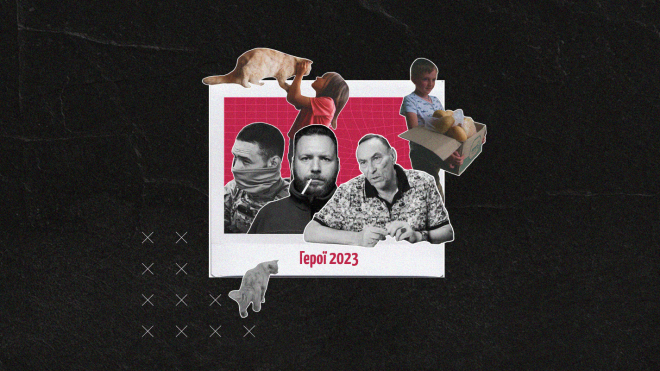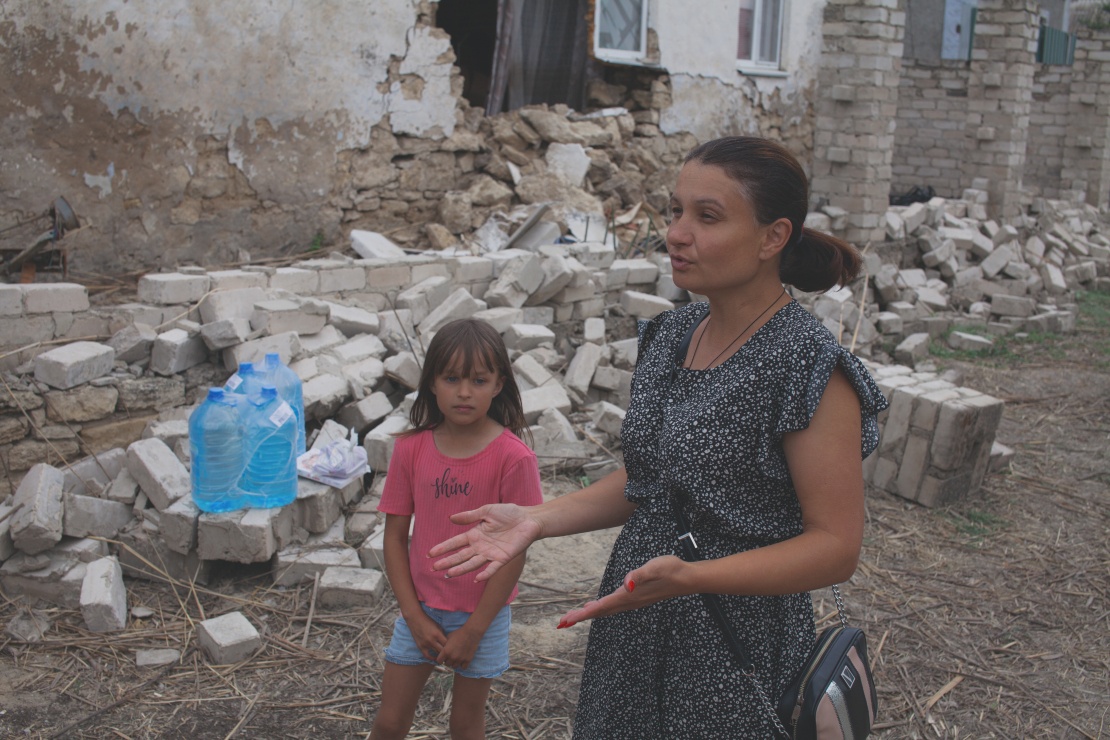Tetyana Shapirʼs family from the Mykolaiv region lost their home due to the explosion of the Kakhovka HPP. Thanks to you, Tanya bought a new house in September — and for the first time felt happy
Tetyana Shapir and her daughter stand near a destroyed house in Afanasiivka. Now the family has finally started a new life
Mykhailo Melnychenko / «Babel'»
A movie could be made about the fate of the Shapir family. Tatiana Shapir is 40 years old, her husband Oleksandr is 50. Before the full-scale invasion, they lived in the village of Afanasiivka, Mykolaiv region, raised three children, and worked as farmers. They had time to rebuild and renovate the house they inherited from their grandmother. It stood right on the bank of the Ingulets River, and swans could be seen from its larger room.
"Anyone who came to visit us said: ʼYou have paradise here,ʼ" Tanya recalls.
The Russians occupied the village already on the third day — February 26. During the occupation, the Shapirs passed on data about Russian equipment to the Ukrainian Armed Forces, and later they were forced to flee to Pervomaysk, Mykolaiv Region — one of their neighbors told occupiers about them. When they settled a bit in their new place, the AFU liberated their native village. So the Shapirs distributed their beet crop to people and returned home to Afanasiivka in the spring of 2023. And already in July, the Russians blew up the Kakhovka HPP. The Shapirsʼ house on the bank of the river was flooded.
The family moved to Oleksandrʼs parents — they shared a small two-room house with his own brother and son, grandfather and grandmother. Nine people in total. Adults slept on the floor, children on beds.
"I lie down and think: maybe itʼs all a dream? Will I wake up in my bed? Every time I have such a dream," Tetyana said in July 2023.
You collected 550 thousand hryvnias for Tanya and her family. Most of it was donated by businessman Maksym Shkil. In September, the family bought a house in Snihurivka, Mykolaiv region, there were no houses for sale in their native Afanasiivka. The family has already made repairs. Now each child has his own room. Tanya is happy and still thanks us, and we thank you.
"You saved our family," says Tanya. "I found such friends with whom you can not be afraid of anything."
Saper Valera together with his comrades demined fields in the Zaporizhzhia region. Even before the article came out, his foot was torn off — and you collected 400,000 hryvnias for treatment and a prosthesis
Valera is one of those sappers, thanks to whom the Ukrainian counteroffensive advanced. We believe (and expect) that he will get back on his feet
Олексій Ковальов / «Бабель»
Valera is 21 years old. He is a sapper, fighting in the Zaporizhzhia direction. He did not choose his profession by chance: his cousin died when she stepped on a Russian mine after the full-scale invasion. Valera says that the sapper is a "family story", although the whole family is now in the occupied Skadovsk of the Kherson region.
In September, "Babel" journalist Ghanna Mamonova went to the Zaporizhzhia region to make a report with Valera and his brother Danylo. The boys told how they fight, how they clear fields of mines and make way for equipment and infantry.
A few days before the publication of the article, Valeraʼs foot was torn off. You collected over 400,000 hryvnias for treatment and prosthetics. Valera hoped that he would soon have a prosthesis, but the pictures showed that bone fragments remained in the wound, and the operation did not go very well. Doctors say that now it is necessary to stand on a prosthesis, see how everything will go, and after that, most likely, there will be another operation. The prosthesis is ready.
"I want to thank everyone for their support during this difficult time for me. Now I have physical training, it is difficult to start all over again, — says Valera. — Doctors say they will amputate again. Itʼs very hard morally — pain again, hospitals again, but we donʼt give up."
"We" are Valeraʼs girlfriend and brothers who support him. If you want to join, you can support them with money. Here is the card: 5375 4112 1065 5267 and a link to the bank account.
Dmytro Mrachnyk, a soldier of the Ukrainian Armed Forces and a former journalist of "Babel", has been fighting since the first day of the full-scale war. In July, you collected 45,000 hryvnias for batteries for walkie-talkies for his unit
Dmytro Mrachnyk, former editor of "Babel" news desk, and now a fighter of the Armed Forces of Ukraine. We help him with donations, and he helps us with kind words and hope
Kyivans know Dima Mrachnyk first of all thanks to his tattoo studio Black Swallow Tattoo, where he worked with Kolya Kolshchik, who also went to the front. For some time, Dima worked as a news journalist at "Babel" and was the editor of the satirical publication about politics and culture "Nihilist". Shortly before the invasion, he started making shoes, and on February 24, 2022, he was mobilized. Fought in Kharkiv region and Donetsk region. We support Dmytroʼs unit with equipment, and you collected money for batteries for walkie-talkies.
"When I was sent to study [in the west of Ukraine] in the spring, I was worried that I would miss the counteroffensive. Well, you know how it was in the Kharkiv region: a couple of days — and thatʼs it — Mrachnyk recalls last year. — Personally, I dreamed that in 2-3 months we will have the next victory. [This didnʼt happen.] But at least I didnʼt miss anything and learned a lot. And I also learned a lot about Donbas — for example, what it is like in summer and autumn, how much toxic ambrosia is in its fields, how enchanting its hills and sky are. You can get used to it and love it in half a year."
Dima rarely says that "everything is lost" (for this we love him even more), but he asks civilians to finally understand that there will probably be no more quick victories. The main thing is to help each other as it was before.
"The one with the stronger arguments will win," he says. “One of our argument is national support, a reliable rear that will not leave soldiers with holes in their pants, without wheels, batteries or drones. Thanks to Babelʼs help, we have improved communication, energy autonomy and mobility. Itʼs inspiring. We are alive, relatively healthy and fighting not just for a flag and an abstract homeland, but for freedom and justice, for our common cause, love and passion."
The Mykolayiv Zoo became one of the symbols of indomitability at the beginning of the Great War. You helped it by buying tickets online — help it now too
Director of Mykolaiv Zoo Volodymyr Topchiy in his office. He often lives in a zoo to look after the animals
Mykhailo Melnychenko / «Babel'»
Volodymyr Topchiy, director of the Mykolaiv Zoo, has been working there for 45 years, twenty of them as director. He jokes that in the first month of the full-scale war, he "cried help out" — he burst into tears during one of the video interviews. This video prompted people from all over the world to buy tickets to a zoo they couldnʼt enter. European zoos also helped — together they managed to collect about $2.5 million. For half a year in 2022, employees lived in a zoo. During blackouts, oxygen was supplied to aquariums with fish thanks to a generator that was started from a tractor. Fragments of rockets fell on the enclosures, there was not enough dry fodder, meat and vegetables, but during the great war not a single animal died from hunger and cold.
Now the zoo is in hibernation — some animals are really sleeping, and there are few visitors due to the weather.
"Thank God, the winter is warm. We have prepared, we have a supply of fodder," says the director.
He is holding on, says everything is fine, but the zoo still has many problems. Aid from European colleagues has ended, online tickets have not been bought for a long time, and the city has cut the budget for the zoo for next year in half. So the animals need your help again. The algorithm is old — buy a ticket on the website, itʼs only one hundred hryvnias and hope that everything will definitely be fine.
Roman Kholodovʼs team is evacuating soldiers from the front day and night. This is also thanks to your support. The main thing is not to lose pace
Roman Kholodov saves children and soldiers. His team works day and night — and they really need your support
Roman Kholodov is the head of the social service department of the Kyiv Metropolis of the OCU. Before the full-scale invasion, he transported seriously ill children and adults for treatment throughout Ukraine and abroad. On February 23, 2022, Kholodov and his team were in Belarus evacuating a woman home to Ukraine after a liver transplant. The next day, when Russia had already invaded Ukraine, Romanʼs team began evacuating palliative care children from Kyiv hospitals. On the second of March, the boys took out the Kyiv orphanage and put the children on a train to Poland.
During the full-scale Russiaʼs invasion, Roman and his team evacuated thousands of wounded soldiers, 700 civilians and 268 seriously ill children from the war zone. He saw pictures that he will never forget. For several months, Roman collected money for modern evacuation buses to rescue Ukrainian soldiers from the front. In August, thanks to donations and the Volyn Brotherhood of St. Volodymyr, he received two cars for 24 lying and 50 sitting places. Help is needed now.
"The team is working to the point of exhaustion, as is the equipment," explains Roman. “Considering the number of departures, you understand how many wounded soldiers we evacuated. Exhausting battles are going on, and the need for the work of our mission, unfortunately, is growing."
You can donate to Roman Kholodovʼs team and help save lives at the bank using the link or by card: 5375 4114 0615 0644. Also, the mission is in great need of fuel. Those who can help, we will contact Roman directly. Write to us in Telegram.
This is where we always ask you to support Babel, and now we want to thank you for supporting others. THANK YOU (and we hate Caps Lock).

